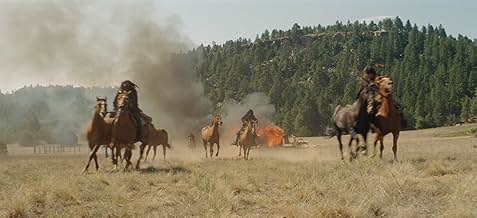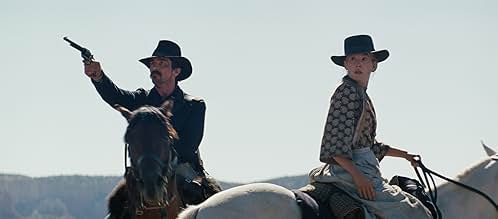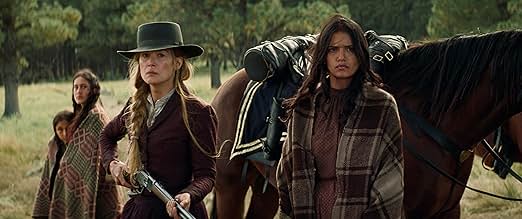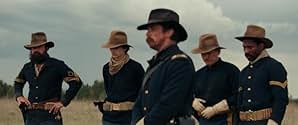Im Jahr 1892 stimmt ein legendärer Militärhauptmann widerwillig zu, einen Cheyenne-Häuptling und seine Familie durch gefährliches Gebiet zu eskortieren.Im Jahr 1892 stimmt ein legendärer Militärhauptmann widerwillig zu, einen Cheyenne-Häuptling und seine Familie durch gefährliches Gebiet zu eskortieren.Im Jahr 1892 stimmt ein legendärer Militärhauptmann widerwillig zu, einen Cheyenne-Häuptling und seine Familie durch gefährliches Gebiet zu eskortieren.
- Regie
- Drehbuch
- Hauptbesetzung
- Auszeichnungen
- 4 Gewinne & 7 Nominierungen insgesamt
Gray Wolf Herrera
- Apache Man
- (as Graywolf Herrera)
Timothée Chalamet
- Pvt. Philippe DeJardin
- (as Timothee Chalamet)
Empfohlene Bewertungen
Many reviewing Hostiles have chosen to seize upon avenues to criticize the film. Most common is the unfortunate chronological error where the Presidential order directing the mission was signed by Benjamin Harrison. This places the story in the period of 1889 to 1893, years too late to make sense.
Such a mistake is lamentable. The time period of the story would have ideally taken place from 1879 to 1880, when Rutherford Hayes was President, and the United States had largely defeated hostile tribes in the southwest and northern plains, but would be before the establishment of the railroad lines in New Mexico. This would have necessitated the pack mule excursion to Montana. It also would have allowed sufficient time to pass, given the references to Wounded Knee (1873) and Little Big Horn (1876), for the bitter memories to start to recede and allow the reflections shown in the movie to take place.
However, a fair review of this movie must avoid getting bogged down in historical minutia and instead focus on the story, because it is very poignant.
In many ways, this movie is to be congratulated for avoiding the modern day political traps that permeate so much of entertainment today.
The opening scene is brutal and forms the core of the story. A band of renegades attack a settlement home and leave a gash of misery in their wake. But, that is the coda of what the protagonists deal with, past chapters of great violence in a collision of hostile cultures.
The isolated acts of violence that happen later are as much a cleaning up of past deeds and a completion of the catharsis of reconciliation.
This movie is an immersion into the psyche of those who carry out acts of wartime violence, in a fight for survival, and how they try to retain their sanity and civility. As the story shows, some handle it better than others. None escape without deep scars.
There is a second theme that runs throughout the movie, ignorant people at the beginning and the end, attempting to lodge their persuasion onto the protagonists. None of these men suffered the wartime violence, but instead try to insert an empty moralizing, or attempt to enact their selfish will despite the clear Presidential mandate to allow the mission to proceed.
The reporter at the start of the film is silenced through humiliation. The second group at the end of the film meets a more lasting end. And at the end, we are left with shared misery among the few survivors, who try to bravely go on with what is left good to cling to.
Christian Bale is masterful in this movie. It is sad that his performance was not properly recognized.
Ultimately, this is a story of redemption, and in that regard it mirrors what took place over generations in America. A clash of survival ending with one side defeated, while both sides had to reconcile the shared experience of brutality. It avoids political finger-pointing, and in that regard strikes the proper degree of respect for both sides in this American struggle. It is a welcome addition to Hollywood's collection of period movies.
Such a mistake is lamentable. The time period of the story would have ideally taken place from 1879 to 1880, when Rutherford Hayes was President, and the United States had largely defeated hostile tribes in the southwest and northern plains, but would be before the establishment of the railroad lines in New Mexico. This would have necessitated the pack mule excursion to Montana. It also would have allowed sufficient time to pass, given the references to Wounded Knee (1873) and Little Big Horn (1876), for the bitter memories to start to recede and allow the reflections shown in the movie to take place.
However, a fair review of this movie must avoid getting bogged down in historical minutia and instead focus on the story, because it is very poignant.
In many ways, this movie is to be congratulated for avoiding the modern day political traps that permeate so much of entertainment today.
The opening scene is brutal and forms the core of the story. A band of renegades attack a settlement home and leave a gash of misery in their wake. But, that is the coda of what the protagonists deal with, past chapters of great violence in a collision of hostile cultures.
The isolated acts of violence that happen later are as much a cleaning up of past deeds and a completion of the catharsis of reconciliation.
This movie is an immersion into the psyche of those who carry out acts of wartime violence, in a fight for survival, and how they try to retain their sanity and civility. As the story shows, some handle it better than others. None escape without deep scars.
There is a second theme that runs throughout the movie, ignorant people at the beginning and the end, attempting to lodge their persuasion onto the protagonists. None of these men suffered the wartime violence, but instead try to insert an empty moralizing, or attempt to enact their selfish will despite the clear Presidential mandate to allow the mission to proceed.
The reporter at the start of the film is silenced through humiliation. The second group at the end of the film meets a more lasting end. And at the end, we are left with shared misery among the few survivors, who try to bravely go on with what is left good to cling to.
Christian Bale is masterful in this movie. It is sad that his performance was not properly recognized.
Ultimately, this is a story of redemption, and in that regard it mirrors what took place over generations in America. A clash of survival ending with one side defeated, while both sides had to reconcile the shared experience of brutality. It avoids political finger-pointing, and in that regard strikes the proper degree of respect for both sides in this American struggle. It is a welcome addition to Hollywood's collection of period movies.
"Sometimes I envy the finality of death. The certainty. And I have to drive those thoughts away when I wake." Rosalie Quaid (Rosamund Pike)
Although Quaid's words might well be the anthem of this brutal, quiet, moving 1892 western, they harbinger the death of the Wild West and the birth of justice and equality as whites and Native Americans abandon slowly the death that brought little peace to either side. Appropriately the tone in unremittingly grave, and rightly so, for the film illustrates the wages of racism as well as any contemporary screed could try to do.
Writer/director Scott Cooper, who knows a thing or two about the passing of time and custom with his poignant Crazy Heart, drives home the loss of the Indian's world, the cost to the US troops, and the bereft families on each side. Captain Joe Blocker (Christian Bale), a legendary anti-Native American fighter, is charged with escorting Cheyenne war chief Yellow Hawk (Wes Studi), also a killer, and his family from New Mexico to his home in Montana, where the government determined he should be allowed to die.
Cooper is at his best filming landscapes occasionally punctuated with John-Ford-like door framed shots and themes of abduction and reconciliation. The threats along the way are external and internal, often soldiers just as culpable as the "savages" they hunt. Joe is a man on a mission to bring justice against the Indians, but like the times he's in, it is time to change to benevolence as the end of the century approaches and a kinder world of connection and cooperation begins, slowly and surely, like the film. The appreciation for a person regardless of race, is Cooper's ultimate aim. In ways, this Western is reminiscent of the revisionist Dances with Wolves, both of whose slow pace, almost at time painful, is reflective change's pace.
Cooper's shots are generous to the beautiful faces, from Mrs. Quaid's lovely and the stoically-contemplative Joe's to the chief's landscaped leather. The ensemble is first rate, especially the feisty Ben Foster as Sgt. Charles Wills. The landscapes? well, look at Ford's and feel his tradition.
Although Quaid's words might well be the anthem of this brutal, quiet, moving 1892 western, they harbinger the death of the Wild West and the birth of justice and equality as whites and Native Americans abandon slowly the death that brought little peace to either side. Appropriately the tone in unremittingly grave, and rightly so, for the film illustrates the wages of racism as well as any contemporary screed could try to do.
Writer/director Scott Cooper, who knows a thing or two about the passing of time and custom with his poignant Crazy Heart, drives home the loss of the Indian's world, the cost to the US troops, and the bereft families on each side. Captain Joe Blocker (Christian Bale), a legendary anti-Native American fighter, is charged with escorting Cheyenne war chief Yellow Hawk (Wes Studi), also a killer, and his family from New Mexico to his home in Montana, where the government determined he should be allowed to die.
Cooper is at his best filming landscapes occasionally punctuated with John-Ford-like door framed shots and themes of abduction and reconciliation. The threats along the way are external and internal, often soldiers just as culpable as the "savages" they hunt. Joe is a man on a mission to bring justice against the Indians, but like the times he's in, it is time to change to benevolence as the end of the century approaches and a kinder world of connection and cooperation begins, slowly and surely, like the film. The appreciation for a person regardless of race, is Cooper's ultimate aim. In ways, this Western is reminiscent of the revisionist Dances with Wolves, both of whose slow pace, almost at time painful, is reflective change's pace.
Cooper's shots are generous to the beautiful faces, from Mrs. Quaid's lovely and the stoically-contemplative Joe's to the chief's landscaped leather. The ensemble is first rate, especially the feisty Ben Foster as Sgt. Charles Wills. The landscapes? well, look at Ford's and feel his tradition.
9eccl
Excellent acting (of course by Bale and Pike and their chemistry; but also by the entire crew), beautiful variety of scenery and smart music score. After reading other reviews, i thought it would not meet expectations; however, Hostiles did not disappoint. It was a well paced journey (left my wife and i wanting more), with authentic fight scenes and sounds; as well as interesting relationships and lessons in duty, sacrifice and care. Suspenseful, adventurous, romantic, emotional and dramatic; better than nearly all of the old 1940s and 1950s westerns; and more classy than the most of the post-Wayne, Stewart, and Scott ones. Unlike many that story line is primarily about revenge or some criminal motive; Hostiles is about a mission and survival.
This movie won't be for everyone. It's dark, fairly "slow" paced, and at times brutal. But at it's core, this movie is about forgiveness -- and for me, it rang true and was emotionally impactful. Christian Bale is in top form here, and his performance as well as the rest of the cast is great. It's beautifully shot and the score is haunting and harrowing. Well directed and worth watching -- just don't expect this to be a fast paced thrilling Western. It's not heavy on plot -- it's more thematic.
Wusstest du schon
- WissenswertesThe widow of credited screenwriter Donald E. Stewart found the "Hostiles" script when moving houses. Stewart, who died in 1999, had not shipped the manuscript to any studios, and his wife was surprised to come across it. After seeing Crazy Heart (2009) and Auge um Auge - Out of the Furnace (2013), she felt that Scott Cooper was the right man to shepherd it towards the screen.
- PatzerThere is a single African-American soldier, Corporal Henry Woodson, in an otherwise White cavalry regiment. The only Black cavalrymen in the regular army were in the 9th and 10th regiments, where only the officers were White.
- Zitate
Rosalie Quaid: Sometimes I envy the finality of death. The certainty. And I have to drive those thoughts away when I'm weak.
- VerbindungenFeatured in WatchMojo: Top 10 Failed Oscar Bait Movies of 2017 (2018)
Top-Auswahl
Melde dich zum Bewerten an und greife auf die Watchlist für personalisierte Empfehlungen zu.
- How long is Hostiles?Powered by Alexa
Details
- Erscheinungsdatum
- Herkunftsland
- Offizieller Standort
- Sprachen
- Auch bekannt als
- Hostiles: Violencia americana
- Drehorte
- Angel Fire, New Mexico, USA(exterior scenes)
- Produktionsfirmen
- Weitere beteiligte Unternehmen bei IMDbPro anzeigen
Box Office
- Budget
- 39.000.000 $ (geschätzt)
- Bruttoertrag in den USA und Kanada
- 29.819.114 $
- Eröffnungswochenende in den USA und in Kanada
- 22.849 $
- 24. Dez. 2017
- Weltweiter Bruttoertrag
- 35.669.017 $
- Laufzeit
- 2 Std. 14 Min.(134 min)
- Farbe
- Sound-Mix
- Seitenverhältnis
- 2.39 : 1
Zu dieser Seite beitragen
Bearbeitung vorschlagen oder fehlenden Inhalt hinzufügen







































